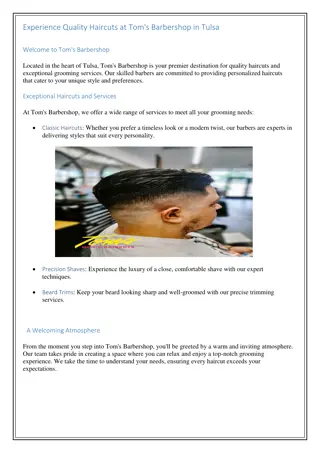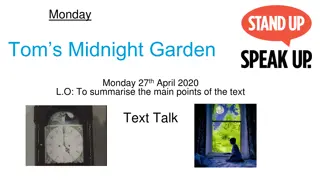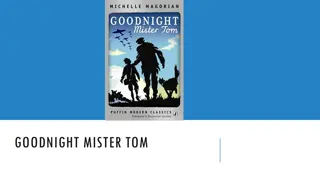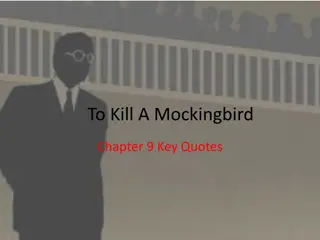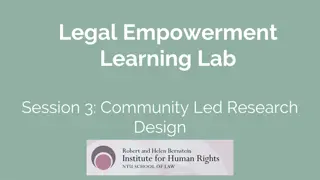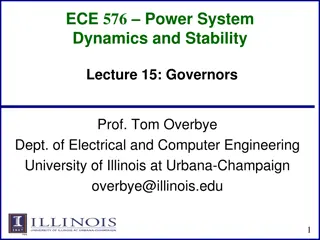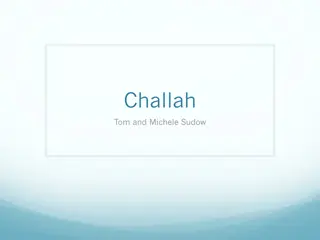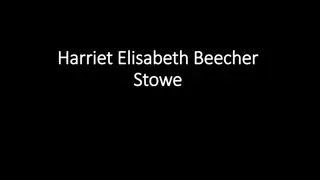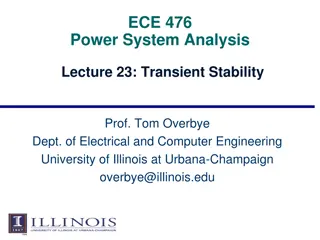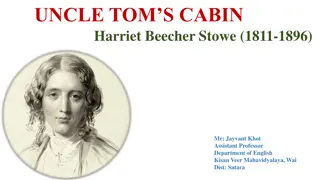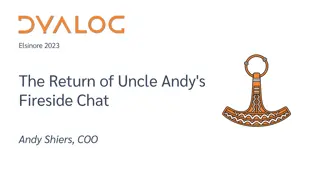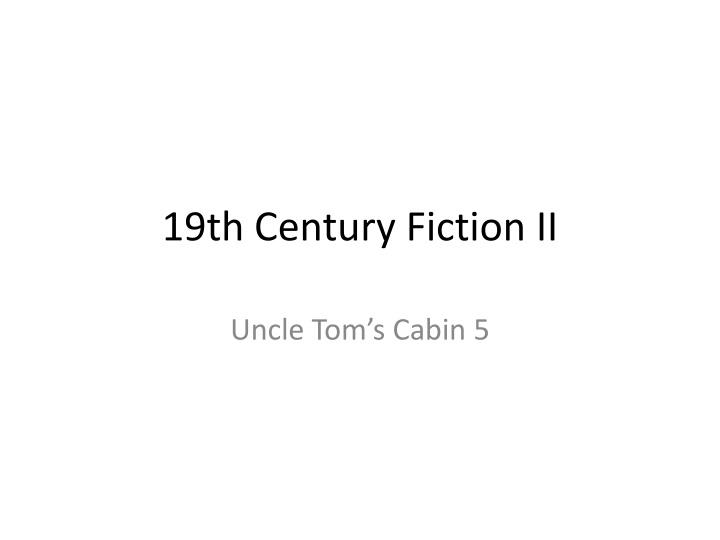
Exploring Themes of Transformation and Compassion in Uncle Tom's Cabin
Dive into the intricate portrayal of transformation and compassion in Uncle Tom's Cabin through the character of Topsy, a young slave taught to believe she is inherently evil. Witness her journey towards self-realization and love, juxtaposed against the challenges faced by Miss Ophelia and St. Clare in understanding and empathizing with the plight of slaves. Explore how Topsy's evolution challenges societal norms and ideologies prevalent in the 19th-century context, shedding light on the complexities of human nature and relationships.
Download Presentation

Please find below an Image/Link to download the presentation.
The content on the website is provided AS IS for your information and personal use only. It may not be sold, licensed, or shared on other websites without obtaining consent from the author. If you encounter any issues during the download, it is possible that the publisher has removed the file from their server.
You are allowed to download the files provided on this website for personal or commercial use, subject to the condition that they are used lawfully. All files are the property of their respective owners.
The content on the website is provided AS IS for your information and personal use only. It may not be sold, licensed, or shared on other websites without obtaining consent from the author.
E N D
Presentation Transcript
19th Century Fiction II Uncle Tom s Cabin 5
Uncle Toms Cabin Chapter 20 Now, Augustine, what upon earth is this for? said Miss Ophelia. Your house is so full of these little plagues, now, that a body can t set down their foot without treading on em. I get up in the morning, and find one asleep behind the door, and see one black head poking out from under the table, one lying on the door-mat, and they are mopping and mowing and grinning between all the railings, and tumbling over the kitchen floor! What on earth did you want to bring this one for? For you to educate didn t I tell you? You re always preaching about educating. I thought I would make you a present of a fresh-caught specimen, and let you try your hand on her, and bring her up in the way she should go. I don t want her, I am sure; I have more to do with em now than I want to. That s you Christians, all over! you ll get up a society, and get some poor missionary to spend all his days among just such heathen. But let me see one of you that would take one into your house with you, and take the labor of their conversion on yourselves! No; when it comes to that, they are dirty and disagreeable, and it s too much care, and so on. Augustine, you know I didn t think of it in that light, said Miss Ophelia, evidently softening. Well, it might be a real missionary work, said she, looking rather more favorably on the child. St. Clare had touched the right string. Miss Ophelia s conscientiousness was ever on the alert. But, she added, I really didn t see the need of buying this one; there are enough now, in your house, to take all my time and skill. Well, then, Cousin, said St. Clare, drawing her aside, I ought to beg your pardon for my good-for-nothing speeches. You are so good, after all, that there s no sense in them. Why, the fact is, this concern belonged to a couple of drunken creatures that keep a low restaurant that I have to pass by every day, and I was tired of hearing her screaming, and them beating and swearing at her. She looked bright and funny, too, as if something might be made of her; so I bought her, and I ll give her to you. Try, now, and give her a good orthodox New England bringing up, and see what it ll make of her. You know I haven t any gift that way; but I d like you to try.
Uncle Toms Cabin Topsy s funtion in the novel must be well- thought. She is a poor little slave who is taught that she is evil. Her transformation will be through love but Miss Ophelia is not the one to feel for her. Miss Ophelia and St. Clare are not models of good Chrisitans. One is too lazy, as he confesses, to go against slavery, the other does not feel for the slaves. Question how Topsy transforms Miss Ophelia.
Uncle Toms Cabin Chapter 25 What does make you so bad, Topsy? Why won t you try and be good? Don t you love anybody, Topsy? Donno nothing bout love; I loves candy and sich, that s all, said Topsy. But you love your father and mother? Never had none, ye know. I telled ye that, Miss Eva. O, I know, said Eva, sadly; but hadn t you any brother, or sister, or aunt, or No, none on em, never had nothing nor nobody. But, Topsy, if you d only try to be good, you might Couldn t never be nothin but a nigger, if I was ever so good, said Topsy. If I could be skinned, and come white, I d try then. But people can love you, if you are black, Topsy. Miss Ophelia would love you, if you were good. Topsy gave the short, blunt laugh that was her common mode of expressing incredulity. Don t you think so? said Eva. No; she can t bar me, cause I m a nigger! she d s soon have a toad touch her! There can t nobody love niggers, and niggers can t do nothin ! I don t care, said Topsy, beginning to whistle. O, Topsy, poor child, I love you! said Eva, with a sudden burst of feeling, and laying her little thin, white hand on Topsy s shoulder; I love you, because you haven t had any father, or mother, or friends; because you ve been a poor, abused child! I love you, and I want you to be good. I am very unwell, Topsy, and I think I shan t live a great while; and it really grieves me, to have you be so naughty. I wish you would try to be good, for my sake; it s only a little while I shall be with you. The round, keen eyes of the black child were overcast with tears; large, bright drops rolled heavily down, one by one, and fell on the little white hand. Yes, in that moment, a ray of real belief, a ray of heavenly love, had penetrated the darkness of her heathen soul! She laid her head down between her knees, and wept and sobbed, while the beautiful child, bending over her, looked like the picture of some bright angel stooping to reclaim a sinner. Poor Topsy! said Eva, don t you know that Jesus loves all alike? He is just as willing to love you, as me. He loves you just as I do, only more, because he is better. He will help you to be good; and you can go to Heaven at last, and be an angel forever, just as much as if you were white. Only think of it, Topsy! you can be one of those spirits bright, Uncle Tom sings about. O, dear Miss Eva, dear Miss Eva! said the child; I will try, I will try; I never did care nothin about it before.
Uncle Toms Cabin Topsy says she is evil a number of times up to Chapter 25. In this chapter we see how Topsy is transformed almost magically. The girl who demands to be whipped because she is evil, instantly says she will try to be good. Thanks to Eva s overflow of love.
Uncle Toms Cabin Chapter 27 The child lay panting on her pillows, as one exhausted, the large clear eyes rolled up and fixed. Ah, what said those eyes, that spoke so much of heaven! Earth was past, and earthly pain; but so solemn, so mysterious, was the triumphant brightness of that face, that it checked even the sobs of sorrow. They pressed around her, in breathless stillness. Eva, said St. Clare, gently. She did not hear. O, Eva, tell us what you see! What is it? said her father. A bright, a glorious smile passed over her face, and she said, brokenly, O! love, joy, peace! gave one sigh and passed from death unto life!
Uncle Toms Cabin Eva s death, though is unbearable for any sensitive person, it is presented in a very religious manner. Her death is a major step in Miss Ophelia s transformation as you can see in the next chapter and in the next slide.
Uncle Toms Cabin Chapter 26 There was a piercing wildness in the cry; the blood flushed into St. Clare s white, marble-like face, and the first tears he had shed since Eva died stood in his eyes. Get up, child, said Miss Ophelia, in a softened voice; don t cry so. Miss Eva is gone to heaven; she is an angel. But I can t see her! said Topsy. I never shall see her! and she sobbed again. They all stood a moment in silence. She said she loved me, said Topsy, she did! O, dear! oh, dear! there an t nobody left now, there an t! That s true enough said St. Clare; but do, he said to Miss Ophelia, see if you can t comfort the poor creature. I jist wish I hadn t never been born, said Topsy. I didn t want to be born, no ways; and I don t see no use on t. Miss Ophelia raised her gently, but firmly, and took her from the room; but, as she did so, some tears fell from her eyes. Topsy, you poor child, she said, as she led her into her room, don t give up! I can love you, though I am not like that dear little child. I hope I ve learnt something of the love of Christ from her. I can love you; I do, and I ll try to help you to grow up a good Christian girl.
Uncle Toms Cabin Chapter 40 Well, Tom! said Legree, walking up, and seizing him grimly by the collar of his coat, and speaking through his teeth, in a paroxysm of determined rage, do you know I ve made up my mind to KILL YOU? It s very likely, Mas r, said Tom, calmly. I have, said Legree, with a grim, terrible calmness, done just that thing, Tom, unless you ll tell me what you know about these yer gals! Tom stood silent. D ye hear? said Legree, stamping, with a roar like that of an incensed lion. Speak! I han t got nothing to tell, Mas r, said Tom, with a slow, firm, deliberate utterance. Do you dare to tell me, ye old black Christian, ye don t know? said Legree. Tom was silent. Speak! thundered Legree, striking him furiously. Do you know anything? I know, Mas r; but I can t tell anything. I can die!
Uncle Toms Cabin Tomi as the title of the chapter states, is a martyr. He sacrifices himself to protect other people. Just like Jesus death, his death means salvation for others. He protects Cassy and Emmeline directly and saves the souls of Quimbo and Sambo though their transformation is rather sudden and awkward.
Uncle Toms Cabin The Final Remark: Uncle Tom s Cabin is a sentimental novel that aims to put up a fight against the peculiar institution of the South. The novel ends in a rather deux ex machina fashion but as Alfred Kazin states in the introduction Stowes purpose in writing this novel is not to flatter the slave but to end slavery. In that respect, Uncle Tom s Cabin is not simply a sentimental novel but one with a very serious social and political mission. Even if we may question her means, her mission is nobel one.

